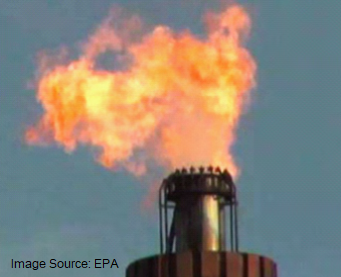The US EPA is holding listening sessions this week on whether they should develop a methane rule. Our Medical Education Advisor Dr. Anne Mellinger-Birdsong spoke on behalf of Mothers & Others For Clean Air today. Here is what she said:
“Let me say up front, Mothers & Others For Clean Air strongly supports EPA’s proposal to develop a rule on methane emissions. Methane directly harms health, and contributes to the climate crisis which is already killing people and harming health in the U.S.
“Methane is a potent greenhouse gas, more potent than CO2. It also contributes to human health problems and causes deaths through ozone formation. In addition, when methane is released during fossil fuel production, many other volatile organic compounds (VOCs) such as benzene, toluene, and xylene are released, many of which are harmful, carcinogenic and also promote ozone formation.
“Right now, we can already see the effects of climate change becoming a health crisis. We are having more and stronger hurricanes, which directly impact health in the U.S., and also affect other countries which leads to climate refugees immigrating here. Where I live in Georgia, in the last few years several hurricanes have injured people and caused major damage to our agricultural production. We are experiencing floods and stronger storms because of climate change. Last summer, the wildfire season in the western U.S. was the worst on record, killing people, destroying homes, and causing disastrous air pollution in many states. This year the drought monitor is even worse than it was at the beginning of last year, so it is expected to be another record fire season.
“Because methane is a shorter lived greenhouse gas, reducing methane releases will have major impact on climate change very quickly. We are in a climate crisis, so issuing a rule to reduce methane releases will help preserve our health and lives.
“Methane also causes health problems. It is one of the VOCs that contribute to ground-level ozone formation. Ozone is as bad for people with emphysema as smoking a pack a day of cigarettes (1), and causes increased mortality in all Medicare recipients. It is even more deadly for seniors who are black. (2) A recent study found that implementing methane control measures would reduce ozone and could avoid half a million premature deaths worldwide. (3) Another study found that the ozone reductions from mitigating methane can be valued at $800 to $1800 per metric ton of methane. (4) In addition, methane leaks from fossil fuel production go hand in hand with other ozone forming and carcinogenic VOCs. There is also some discussion that methane itself, and not just the VOCs that are released at the same time as methane, could cause health problems such as migraines, which can be debilitating.
“In addition to health and mortality, ozone reduces agricultural production, which means that implementing methane controls could increase global production by 2-8%, or about $3-$15 billion worth of crops. (5)
“The International Energy Agency estimates that using existing, available methane control technology could achieve a 75% reduction in methane emissions. We have what we need to do a major amount of reduction, we should just do it now and protect our health.
“In summary, because methane has such harmful effects on human health by way of ozone and food security, because methane is such a powerful greenhouse gas and reducing it could rapidly help address the climate crisis, and because existing technology can reduce emissions by large amounts, Mothers & Others For Clean Air whole-heartedly supports EPA’s efforts to develop a rule to reduce methane and other harmful pollutants.”
References:
1. Wang, Aaron, et al. Association Between Long-term Exposure to Ambient Air Pollution and Change in Quantitatively Assessed Emphysema and Lung Function. JAMA. 2019;322(6):546-556. doi:10.1001/jama.2019.10255
2. Di, Wang, et al. Air Pollution and Mortality in the Medicare Population. N Engl J Med 2017;376:2513-22. DOI: 10.1056/NEJMoa1702747
3. Anenberg, Schwartz, et al. Global Air Quality and Health Co-benefits of Mitigating Near-Term Climate Change through Methane and Black Carbon Emission Controls. https://ehp.niehs.nih.gov/doi/full/10.1289/ehp.1104301
4. Sarofim, Waldhoff, Anenberg. Valuing the Ozone-Related Health Benefits of Methane Emission Controls. Environ Resource Econ (2017) 66:45–63. DOI 10.1007/s10640-015-9937-6
5. Aznery, Mauzerall, and Fiore. Increasing global agricultural production by reducing ozone damages via methane emission controls and ozone-resistant cultivar selection. https://doi.org/10.1111/gcb.12118
06/15/2021





